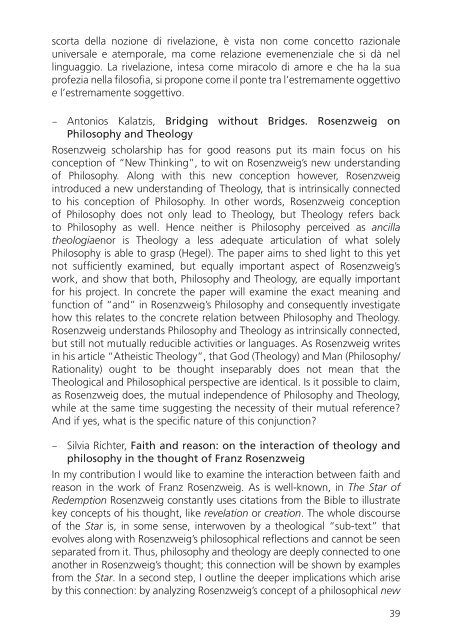Franz Rosenzweig
VZ2hG1
VZ2hG1
Create successful ePaper yourself
Turn your PDF publications into a flip-book with our unique Google optimized e-Paper software.
scorta della nozione di rivelazione, è vista non come concetto razionale<br />
universale e atemporale, ma come relazione evemenenziale che si dà nel<br />
linguaggio. La rivelazione, intesa come miracolo di amore e che ha la sua<br />
profezia nella filosofia, si propone come il ponte tra l’estremamente oggettivo<br />
e l’estremamente soggettivo.<br />
– Antonios Kalatzis, Bridging without Bridges. <strong>Rosenzweig</strong> on<br />
Philosophy and Theology<br />
<strong>Rosenzweig</strong> scholarship has for good reasons put its main focus on his<br />
conception of “New Thinking”, to wit on <strong>Rosenzweig</strong>’s new understanding<br />
of Philosophy. Along with this new conception however, <strong>Rosenzweig</strong><br />
introduced a new understanding of Theology, that is intrinsically connected<br />
to his conception of Philosophy. In other words, <strong>Rosenzweig</strong> conception<br />
of Philosophy does not only lead to Theology, but Theology refers back<br />
to Philosophy as well. Hence neither is Philosophy perceived as ancilla<br />
theologiaenor is Theology a less adequate articulation of what solely<br />
Philosophy is able to grasp (Hegel). The paper aims to shed light to this yet<br />
not sufficiently examined, but equally important aspect of <strong>Rosenzweig</strong>’s<br />
work, and show that both, Philosophy and Theology, are equally important<br />
for his project. In concrete the paper will examine the exact meaning and<br />
function of “and” in <strong>Rosenzweig</strong>’s Philosophy and consequently investigate<br />
how this relates to the concrete relation between Philosophy and Theology.<br />
<strong>Rosenzweig</strong> understands Philosophy and Theology as intrinsically connected,<br />
but still not mutually reducible activities or languages. As <strong>Rosenzweig</strong> writes<br />
in his article “Atheistic Theology”, that God (Theology) and Man (Philosophy/<br />
Rationality) ought to be thought inseparably does not mean that the<br />
Theological and Philosophical perspective are identical. Is it possible to claim,<br />
as <strong>Rosenzweig</strong> does, the mutual independence of Philosophy and Theology,<br />
while at the same time suggesting the necessity of their mutual reference?<br />
And if yes, what is the specific nature of this conjunction?<br />
– Silvia Richter, Faith and reason: on the interaction of theology and<br />
philosophy in the thought of <strong>Franz</strong> <strong>Rosenzweig</strong><br />
In my contribution I would like to examine the interaction between faith and<br />
reason in the work of <strong>Franz</strong> <strong>Rosenzweig</strong>. As is well-known, in The Star of<br />
Redemption <strong>Rosenzweig</strong> constantly uses citations from the Bible to illustrate<br />
key concepts of his thought, like revelation or creation. The whole discourse<br />
of the Star is, in some sense, interwoven by a theological “sub-text” that<br />
evolves along with <strong>Rosenzweig</strong>’s philosophical reflections and cannot be seen<br />
separated from it. Thus, philosophy and theology are deeply connected to one<br />
another in <strong>Rosenzweig</strong>’s thought; this connection will be shown by examples<br />
from the Star. In a second step, I outline the deeper implications which arise<br />
by this connection: by analyzing <strong>Rosenzweig</strong>’s concept of a philosophical new<br />
39


